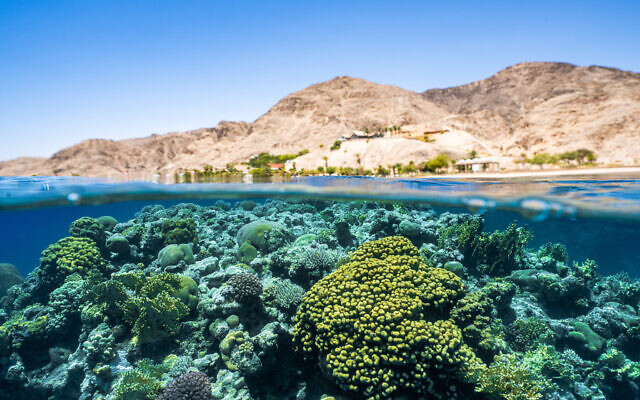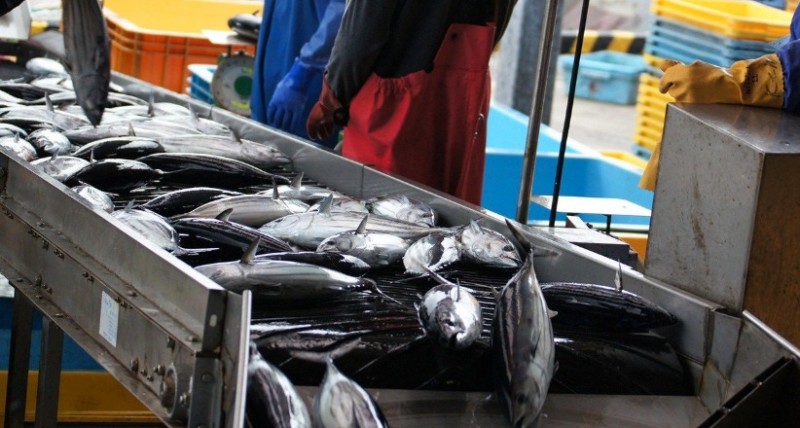Israeli and Australian researchers have discovered that diverse and rich communities of bacteria and invertebrates help corals thrive, a finding that could aid the restoration of reefs damaged by climate change, pollution, and overfishing around the world.
These findings echo the increasing body of terrestrial research highlighting the importance of microscopic creatures like bacteria and fungi for soil and plant health.
The research team designed terracotta tiles to replicate the complex 3D structure of natural coral reefs. They placed some tiles on a healthy reef and others on a damaged reef in the Gulf of Eilat, at the southern tip of Israel.
Over six months underwater, the tiles became colonized by various reef invertebrates and bacteria. They were then swapped: the tiles from the healthy reef were moved to the damaged reef, and vice versa.
Tiles like these, showing corals growing on a healthy community of bacteria and invertebrates, were used for the research off the coast of Eilat in southern Israel. (Credit: Meron Segev)
Two species of corals were fixed onto the tiles and left in place for an additional six months, after which the microbial life on all the tiles was tested.
The researchers found that life was richer and more diverse on the tiles that were moved from the healthy reef to the damaged one.
Corals maintain symbiotic relationships with algae: the corals provide shelter, and the algae nourish themselves through photosynthesis.
Corals grown on tiles with the most vibrant bacterial and invertebrate communities performed better in these symbiotic relationships, with higher photosynthetic capacity and less stress.
“This innovative approach underscores the essential role of healthy reef ecosystems in restoring coral health and resilience,” said Natalie Levy from Bar-Ilan University, who led the research.
“The results highlight the potential of ecosystem transplantation as an effective and sustainable restoration tool that could be integrated with other coral restoration methods, such as coral gardening and artificial reefs,” she added.
Professor Oren Levy, also from Bar-Ilan University, added that the research “advances our understanding of coral restoration and provides an invaluable tool to help address the current global coral crisis. By using healthy ecosystems to regenerate damaged reefs, we can work towards creating more resilient and sustainable coral ecosystems that may one day recover from climate change and other threats.”
The researchers, including Professor Ezri Tarazi from the Technion (Israel Institute of Technology) in Haifa and Professor David Bourne from James Cook University and the Australian Institute of Marine Science, published their findings this month in Nature Communications.
Although they cover less than 1% of the ocean floor, coral reefs are home to more than a quarter of marine life.
However, due to climate change, overfishing, and pollution, more than half of the planet’s reefs have disappeared since the 1950s.
The coral reefs of the Gulf of Eilat, in southern Israel, are expected to continue thriving in warmer waters for some time, for evolutionary reasons. According to Professor Maoz Fine, a coral expert at the Interuniversity Institute of Marine Sciences of Eilat and the Hebrew University of Jerusalem, corals from Eilat have been migrating for 6,000 years from the Indian Ocean via the Bab el-Mandeb Strait, between Djibouti and Yemen. Only corals capable of withstanding the warm waters of this strait could pass through and reach the northern Red Sea and the Gulf of Eilat.
This theory was challenged earlier this month with the first reports of coral bleaching off the coast of Eilat.
According to experts, including Fine, who wrote in the Israeli academic journal Ecology and Environment, this phenomenon follows an unprecedented rise in seawater temperatures.
When the water temperature exceeds a critical threshold, corals expel the algae, and their white skeleton becomes visible, leading to the term « bleaching. » If conditions do not quickly return to normal, the corals eventually starve to death.




